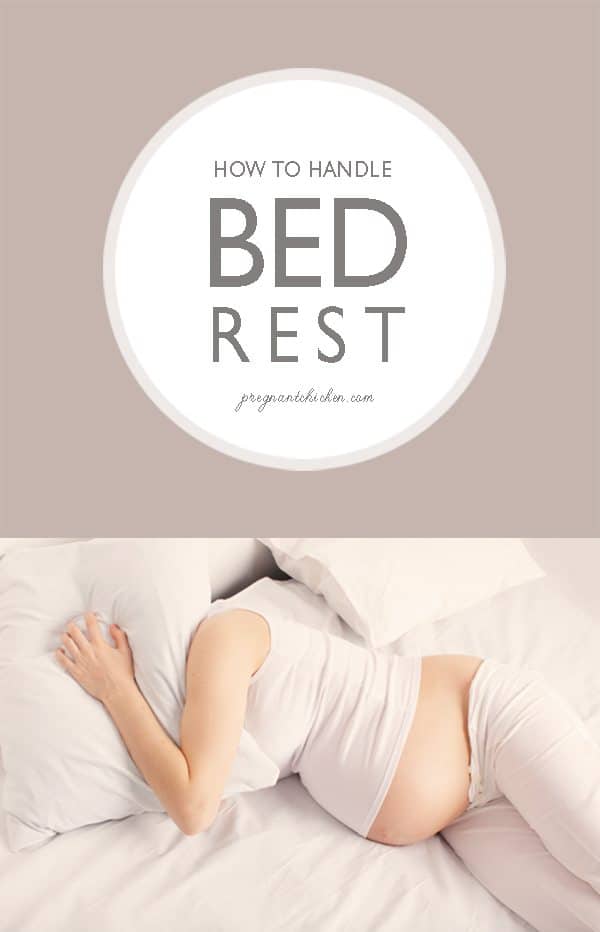It turns out learning how to handle bed rest isn’t part of your standard prenatal birth class, which makes sense – I know. But still, knowing what to expect and how to handle it would have helped me when I was hospitalized and put on bed rest at 23 weeks.
There are many reasons a doctor might choose to hospitalize you for monitoring before your due date. Preeclampsia, early labor (contractions, dilation or both), placenta previa, bulging amniotic sac, or premature water breaking, to name a few. Sometimes you can prepare for your stay by being warned ahead of time; other times, like me, you may go to the hospital to get checked out, only to find out that you will not be allowed to leave.
My Story
During my second pregnancy, at only 23 weeks and 1 day, my water broke while I was sleeping. Since I had never had issues during my first pregnancy, and there was no family history of problems, I tried to shrug it off as urinary incontinence. Luckily, I had some lovely ladies in Ask the Chicks encourage me to get checked out. The ultrasound tech at the hospital verbally relayed my fluid levels to me as “high enough to indicate you probably just peed yourself.” So, I started putting makeup on to try to make it to work. Then, the nurse came in and informed me that the test they had run to see if there were any signs of leaking amniotic fluid came back positive. What?! My OB hadn’t come by to explain any of this to me before the Neonatologist visited with the most depressing fetal survival statistics I had ever heard. Less than a 40% chance of survival; if she did survive, there was an extremely high chance of poor lung development, brain bleeds, developmental delays, cerebral palsy, blindness, death after leaving the NICU within the next year… she just kept going. By the time she left and my OB finally came around, I was in tears. And now wearing mascara because of the damn ultrasound tech.
I was admitted into the hospital and moved into a room where I just quietly freaked out, cried, researched, and texted my mom for supplies (phone charger, laptop, clothes). My husband came after work and we just cried together. I wasn’t in labor, which is a great sign, since most women have their baby within 24-36 hours after their water breaking. We made it past that point. The next milestone was 1 week, where a lot of women also go into labor. Passed it. Flash forward to 8 weeks later, and I’m still here. I am so, so lucky to have made it this far. Because of the risk of infection, she will have to be delivered at 34 weeks, so with only 3 weeks to go, the end is in sight! And the survival statistics/chance of injuries are so much better now at 31 weeks than they were at 23 weeks.
With that experience behind me, here’s what I’ve learned
How to handle bed rest
Acknowledge and validate your feelings
There’s nothing more terrifying than being told by your doctor that something has gone so horribly wrong with your pregnancy that you have to stay in the hospital until your baby is delivered (either due to labor or emergency intervention). Even if you are only 2 weeks away from your due date, the stress of knowing something could go wrong can really get to you.
Talk about how you’re feeling, and don’t hesitate to reach out to whoever you need to – partners, parents, friends, therapists – to get support.
Don’t be afraid to get involved with your care
Educate, educate, educate. You need to be informed about what is going on with you. You will feel better about decisions the doctor makes if you understand why. ASK QUESTIONS ABOUT EVERYTHING. The nurses are super helpful, too.
Get as much information about what is going on with you and your baby as you can, but I do have to warn you about the Internet: some of the information can be overwhelmingly negative.
Also, learn how to read research papers. All you really need is the Abstract (summary) and Results sections. A few studies gave my OB and I some interesting conversations, and even convinced her to change my treatment. I am so lucky to have a very open doctor who is willing to discuss my care with me. Most recently, I failed my glucose tolerance test and was proclaimed to be diabetic (with no prior history or symptoms). After careful research, I discovered that there are multiple studies that suggest after only 3 days of bed rest (I had already been on 50 days), most patients show glucose intolerance issues. Did this change the fact that I need finger sticks after every meal? No, but we agreed I probably am not really diabetic (my sugar levels after eating are always normal anyway). This will help me avoid having to meet with a specialist (more money!) and possibly be put on drugs by an overly cautious on-call doctor.
For researching what to expect with a preemie in the NICU, I cannot recommend enough the book Preemies, second edition by Linden, Paroli and Doron. It has been invaluable in preparing for all the terminology and possible treatments my preemie will need.
Support groups can be helpful but heavy
I joined support groups on Facebook and Baby Center and there were a few cases where women were encouraging new members “Oh, mine too, but look at her now! She’s 3 and healthy!” only to find out that the poor mom getting all the encouragement loses their baby the next week. Take everything with a grain of salt. Also, sometimes the last thing you want to see is a picture of a preemie at your baby’s gestational age, and sometimes success stories are just as bad as the sad ones.
Remember, someone always has it worse
When I feel like I can’t take it anymore, I just remember someone always has it worse. Some women who have issues before 24 weeks (“viability”) are told to terminate their pregnancy every time they see the doctor. A woman in my online support group had 3 other kids and her husband was deployed while she was hospitalized for months. A woman I met here at the hospital had to be in the Trendelenburg position for her entire 7 week stay (slightly upside down) AND had already lost 5 babies (her baby is doing great in the NICU now!).
In some countries, I just learned yesterday, you are required to have hospital staff stay with you in your room 24/7, even while you try to sleep. While I can get up to use the restroom, some women have bed side commodes, bedpan only, or even a catheter. And, at least I have the chance to be on bed rest; I could have lost my baby already. So, I am very, very lucky.
Ask for help!
This was the MOST DIFFICULT thing for both my husband and I. The first week I was here, my beautiful, wonderful coworkers friends that I am lucky to work with asked if I needed anything. As a type A personality control freak, it was physically painful to ask if they could organize a way to get dinners for my husband and son. And I am SO GRATEFUL that I could ask and they could deliver. We have had homemade dinners 2-3 times a week since I was admitted 8 weeks ago.
So how do you handle bed rest? One day at a time.
You can get through this, no matter the outcome, and no matter how long you are on bed rest. Speak up for yourself. If you are lonely, rally more visitors (chaplains and lactation consultants, even if you aren’t religious or don’t intend on breastfeeding, are great visitors). You need to ask for help, and you need to find ways to waste your time while there. And it’s always okay to allow yourself to feel what’s going on–you need to have a few good cries, but don’t dwell on it! You can do this, mama!
Our next recos: The Best Gear When You’re Pregnant On Bed Rest





Leave a Comment